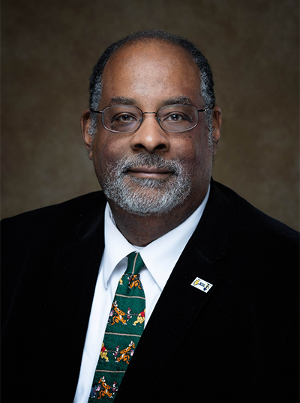
N.C. A&T Joins NCShare Partnership, Enhances Computing and Data Modeling Capacity
04/23/2025 in Research, College of Engineering
By Jackie Torok / 05/24/2024 College of Science and Technology, Biology
EAST GREENSBORO, N.C. (May 24, 2024) – Joseph L. Graves Jr., Ph.D., MacKenzie Scott Endowed Professor of Biology at North Carolina Agricultural and Technical State University, is among three 2024 Genius Award honorees at the 12th Annual Liberty Science Center Genius Gala.
 Sometimes called “Black Darwin,” Graves is the first person of African descent to earn a Ph.D. in evolutionary biology, which he received in 1988 from Wayne State University.
Sometimes called “Black Darwin,” Graves is the first person of African descent to earn a Ph.D. in evolutionary biology, which he received in 1988 from Wayne State University.
His fellow honorees are nuclear fusion pioneer Andrea “Annie” Kritcher, Ph.D., and traumatic brain injury treatment innovator Nicholas Schiff, M.D., along with 2024 Icon Award honoree, actor and space adventurer William Shatner.
Watch the ceremony here: https://www.youtube.com/watch?v=l6g9P1l54L8
Graves is an extensively published evolutionary biologist with pioneering work on the evolution of aging, and in microbial evolution. His explorations of race, biology and genetics have won international acclaim in recent years. In particular, “A Voice in the Wilderness: A Pioneering Biologist Explains How Evolution Can Help Us Solve Our Biggest Problems” (Basic Books) and “Racism, Not Race: Answers to Frequently Asked Questions” (Columbia University Press, co-written with biological anthropologist Alan H. Goodman), both published in 2022, drew rave reviews by critics in higher education and the scientific community.
Graves was born in Westfield, New Jersey, in 1955 at the start of the civil rights movement. He taught himself to read because both of his parents were illiterate. In elementary school, he was wrongly classified as mentally disabled and placed in lower-track academic programs. He went on to graduate from high school as one of the top-ranked students in his class before earning his A.B. in biology from Oberlin College.
Before joining North Carolina A&T, Graves was an assistant professor of evolutionary biology and African American studies at the University of California, Irvine; associate professor and professor of evolutionary biology and African American studies at Arizona State University; core director and professor of biological sciences at Fairleigh Dickinson University; adjunct professor of biological sciences at Midwestern Osteopathic Medical College; and visiting professor at Embry Riddle Aeronautical University.
Graves first served as dean of University Studies for five years, then became associate dean for research at the Joint School of Nanoscience and Nanoengineering for nine years before joining the College of Science and Technology (CoST) in 2019 and receiving his endowed professorship in July 2023. He is a Fellow of the American Association for the Advancement of Science and in 2017 received the Black Engineer of the Year Innovation award. He also is a member of the Society of Evolution, American Society of Microbiologists, American Society of Biological Anthropology, and the International Society for Evolution, Medicine, and Public Health.
As part of his work in CoST, Graves serves as director and co-principal investigator of the Genomics Research and Data Science Center for computation and Cloud Computing (GRADS-4C), created using a $5.8 million grant awarded last fall by the National Institutes of Health. The A&T-based center uses cloud computing platforms to share educational resources for genomic data science to ensure accessibility to various institutions that may not have sophisticated computing facilities.
Graves also is associate director and campus lead for the Precision Microbiome Engineering (Generation Four) Engineering Research Center funded by the National Science Foundation. This is a $26 million award shared by A&T, Duke University, North Carolina State University, University of North Carolina at Chapel Hill and University of North Carolina at Charlotte.
An avid chess enthusiast, Graves said his childhood interest in science was fueled by “Star Trek,” the groundbreaking science fiction television series starring Shatner as Capt. James T. Kirk.
“That’s why I got so turned on to science, the questions that they asked about life on other planets or traveling to the stars. It just blew my mind up as a kid to throw that in with the fact that the first officer in space played three-dimensional chess,” Graves said. “Chess was the single, sole intellectual activity of my youth that set the stage for me becoming a scientist and … it teaches kids how to plan, how to think ahead, how to do deep concentration, and literally, to this day, because of the deep computational and concentration abilities I have from chess I can do things so much faster than my colleagues.”
The sold-out Genius Gala was held May 20 and featured New Jersey Gov. Phil Murphy among the speakers. The event is Liberty Science Center’s celebration honoring great thinkers and doers in science and technology. Proceeds from the event help make world-class science learning accessible to students, teachers and families, including those in high-need communities.
Media Contact Information: jtorok@ncat.edu